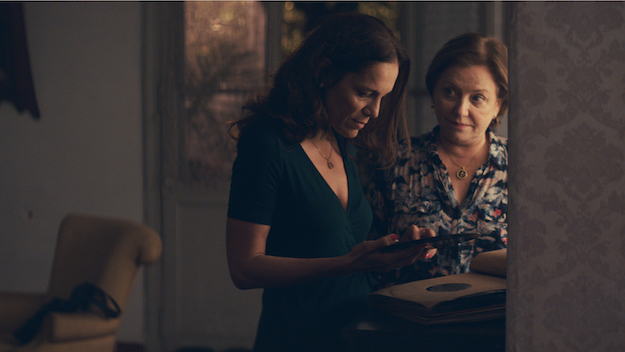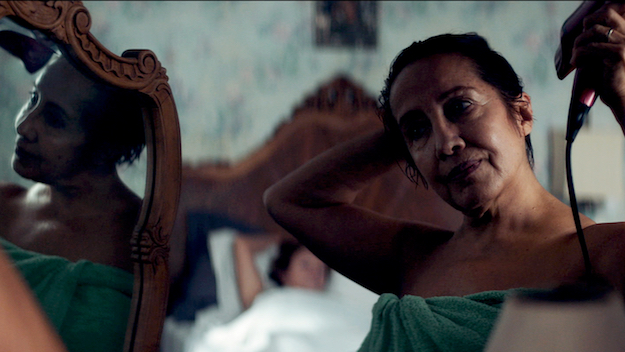Film of the Week: The Heiresses

A protagonist—the screenwriting manuals will tell you—has to want something, and must be prepared to do whatever it takes to get it. But what happens when a protagonist doesn’t particularly want anything, or really know what they want, or would barely have the energy to pursue their desires in any case? Given the ideology of irrepressible agency that dominates mainstream cinema, there’s something a little subversive, at least discreetly dissident, about a film focusing on a character who’s not really that interested in acting—or who doesn’t get round to stirring herself until circumstances work their slow effect on her.
That’s what makes The Heiresses—a Paraguayan drama with an almost entirely female cast—so refreshing, and its central character so mesmerizing, as well as infuriating. This debut feature by writer-director Marcelo Martinessi centers on two women—one with formidable wherewithal to face life’s challenges, the other with a tendency to mooch around passively and let fate get the better of her. The film’s novelty is that it goes with the seemingly insipid partner.
Chela and Chiquita, or “Chiqui”—played by Ana Brun and Margarita Irun, both newcomers to cinema—are women in advanced middle age, long-term life partners who share a large house, in which Chela was born. They have both inherited a large amount of domestic furniture and have presumably known considerable wealth, but now times are hard. At the start of the film, a prospective buyer—one of a succession of wealthy-looking women seen throughout—casts an eye over the various domestic goods that the couple are selling, as they clear out possession after possession. In this opening, the action is seen from a distance, through a door left narrowly ajar: the POV, we realize, is Chela’s, who always looks at life cautiously, from a distance.
The couple’s power relation is ambivalent. Chiqui, tough and pragmatic, knows how to handle the world and other people. She’s in charge, and looks after the neurasthenically sensitive Chela, who spends much of her time in bed, taking assorted medication and apparently barely leaving the house. That passivity, of course, is a way of exerting control. When the couple’s latest maid, Pati (Nilda González), brings her a tray of refreshments at the table where she paints, Chela tells her to always place the coffee cup on the side nearest to her, so she doesn’t have to reach over: this is indolence as power.
Crisis hits. Chiqui is in debt to the bank, which means that legally she is considered guilty of fraud. She can’t avoid a brief prison spell, and it’s significant that the initial prison scenes show Chiqui showing concern for Chela, rather than the other way round: it’s as if being jailed is no sweat, while it’s the fragile partner at home who needs protection and support.
When Chela is drawn out into the world, it’s not through any will of her own, but because she’s being acted on. An older neighbor, Pituca (María Martins, wonderfully imperious and waspish), summons Chela to give her a lift to a friend’s house; Chela would rather spend the day painting, but acquiesces. Pituca insists on being collected too; Chela agrees, and waits patiently alone in the corner of the room while Pituca and her friends finish the game they’re playing. Other members of the circle start wanting lifts too, and handing her money; “It’s just like a taxi,”, says Pituca approvingly, and crushingly. Before long, Chela is running a taxi service; the habit has become a job that she’s fallen into despite herself, or perhaps chosen, with some degree of decisiveness. The film lets us make up our minds which.
Someone who plays a central role in this regard is Angy (Ana Ivanova), the adult daughter of one of Pituca’s friends. She’s first seen hovering in the background as a silhouette, emerges into the foreground scene by scene (at one point, Chela simply directs a gentle half-smile towards her), then becomes one of Chela’s regular clients. Eventually Angy starts telling Chela about her life, in a way that’s at once salutary—it wakes her from a long-time torpor—and explosive, because Chela starts to realize what she’s been missing out on for so long.

The film gradually, undemonstratively, builds up to a moment of truth for Chela, as she’s handed an opportunity to take what she really wants—to express her will and desire. We tend to find it irresistible when put-upon characters in films, especially women, seize the chance to assert themselves in a showstoppingly demonstrative or rebellious manner: it’s one of the things that makes Sebastián Lelio’s Gloria, another film about a middle-aged Latin American woman rediscovering herself, so triumphantly joyous. The Heiresses, however, is rather more downbeat, closer to the understated rhythms of ordinary life. If Chela achieves a breakthrough, it’s without fireworks; her most decisive moments may actually happen far from the camera’s eye.
Martinessi has created a psychologically acute portrait of a relationship that is solid and tender but that has been in a rut for too long, its underlying assumptions remaining unexamined by both partners. The Heiresses is also a study of a topic that cinema often avoids, or when it does tackle it, tends to do so with either spurious feel-goodery or sentimentality: the existence of people who are fundamentally afraid of life or of themselves (Green Book is a recent example of how excruciatingly that theme can be treated).
This film’s sure touch is partly a result of casting. Both Brun and Irun are manifestly real women, with faces and bodies that show the weight and wear of time and age. And they complement each other wonderfully. Irun is particularly good in the prison scenes, where it’s clear that Chiqui has fitted naturally into the bustling conviviality of the yard, getting her hair done like a confident, relaxed lifer, or cheerfully pointing out to Chela her other inmates (like elegant Mrs. Gomez, who murdered her husband and looks as though it was the best decision she ever made).
Brun, by contrast, gives a performance that, you could say, is all flickers. She rarely seems to emote, except in the odd scene such as an early moment where Chela petulantly complains that it’s always her stuff, not Chiqui’s, that gets sold (on which point Chiqui firmly corrects her). Something about Brun’s facial features, as well as those features’ tuning, as it were, is reminiscent of Maria Onetto, who played the traumatized heroine of Lucrecia Martel’s The Headless Woman: in her own way, Chela too is headless, without a clear sense of self or a reliable social radar. Chela has a wary animal quality, picking up distant vibrations, cautiously assessing them. The way that Brun’s face nervously registers low-level tremor of feeling (sometimes tenderness, sometimes desire, mostly anxiety) makes for a wonderful low-key music throughout.
Martinessi and DP Luis Armando Arteaga pursue an elegant style of realism, sketching in a world with narrow parameters, never telling us too much about it. Needless to say, Chela is the partner who’s really in prison, the psychological one she’s made for herself and that Chiqui, knowingly or otherwise, has helped reinforce. Early on, their house is established as an enclosed space: the outside world is signaled by radio broadcasts, or by the sound of dogs in the street; daylight bursts through an open window with a glaring intensity that’s clearly too much for Chela. This hermitage is occasionally visited by not entirely welcome outsiders: one woman, overseeing the removal of a piano she’s bought, is almost shockingly intrusive in her proprietorial loftiness.
Little explicit is said about Paraguayan society or the economic crises, public or private, that have led the couple to this desperate state while so many of their acquaintances stay afloat. We learn little about the pair’s back stories, together or separately. And the ending, involving a simple act, is neither downbeat nor upbeat per se, nor really a resolution. As in life, and in a classic tradition of the modern short story, it leaves us speculating on the incident’s meaning, and its possible consequences, while the film’s quietly devastating revelation—the perilous fragility of social and economic status—rings insistently in the background.
The Heiresses opens January 16 at Film Forum.
Jonathan Romney is a contributing editor to Film Comment and writes its Film of the Week column. He is a member of the London Film Critics Circle.






